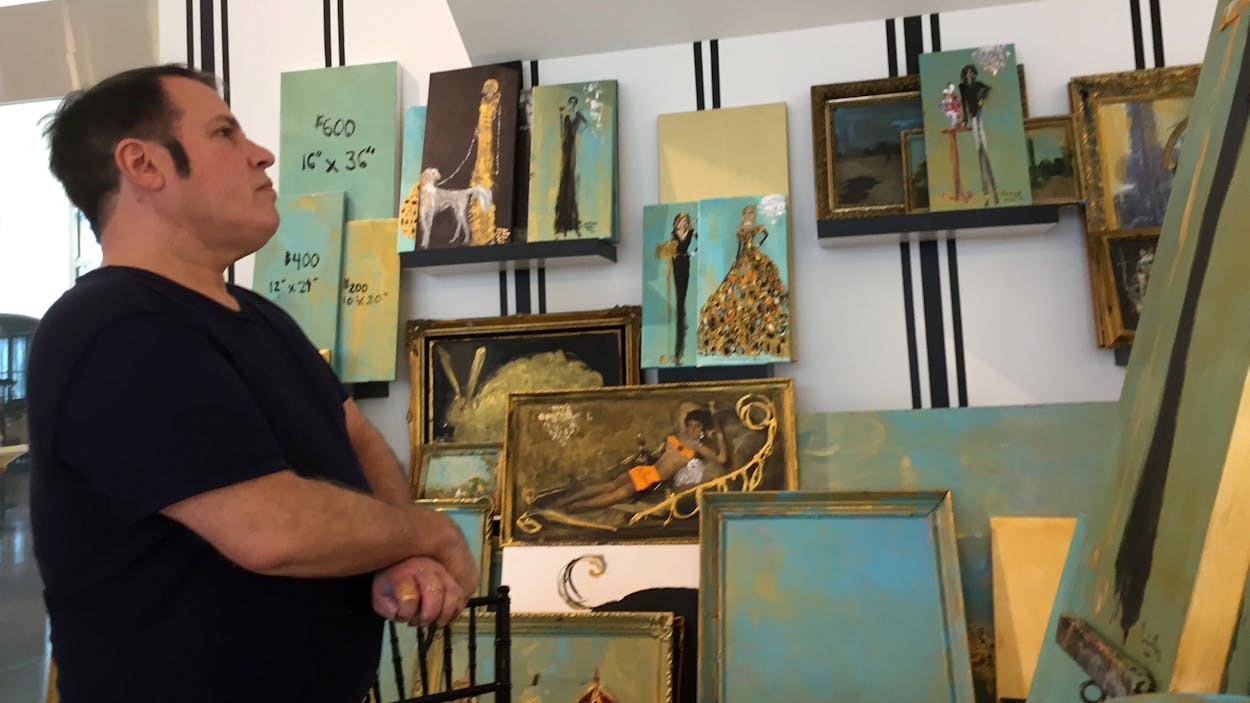San Antonio artist Franco Mondini-Ruiz certainly brags about the beauty of his portraits, but he’s equally boastful about how quickly he creates them. “This one took me twenty minutes,” he said, pointing to a painting of the Riverwalk. “Come on over here and let me paint your portrait,” he told passers-by in the lobby of Tootsies, the tony designer store in Houston’s River Oaks, where he was speed-painting last Friday. “I’m fast!”
Spreading light green backgrounds onto canvases of various sizes so that they might dry in time for his customers’ impromptu sittings, he spoke quickly, rarely pausing to take a breath. “There was a time when I was an angry revolutionary and a lot of my art was ethnic-based, about being second-class,” he said. “In San Antonio, we were invisible in the art world.” Mondini-Ruiz, however, became significantly more visible with his fine china series, in which he situated lovely porcelain figurines atop a pile of pancakes or poking their heads out of a taco (“for awhile, I was the largest purchaser of artificial food in the world”). After that, he moved on to three-dimensional “couture cakes” created out of painted and layered round canvases.
He’s had other projects, but these days, most of his time is spent on a more lucrative art: speed-painting. “I just did a series of the china pieces for Lynn Wyatt, Vivian Wise, and Carolyn Farb commissioned as gifts, but it’s so time consuming,” he said, rushing his strokes across the canvas. “You know, I can make a $15,000 painting in twenty minutes or I can order porcelains. I need to do that as an artist, but the logistics are difficult.”
His unorthodox, economical approach is not always welcomed. He says that the galleries have become too snooty or don’t understand him. “My world does not consist of the art world at all anymore. I don’t like it; it doesn’t like me,” he explained. “It’s a vehicle for social advancement. Parties. We don’t need all those parties. Then if they get funded by the city then it’s about the children, so get the gays out, the druggies out—anything that’s bad that I am. Everything that made me famous! Party poopers! Oh—do we have a customer?”
A red-headed woman in a stretchy, knee-length black dress stood before his frame sizes advertising 16”x 36” for $600, 12”x 24” for $400, and 10”x 20” for $200. Klimt-style portraits full of geometric flourishes, served as examples of his lightning-fast work. “What would you like today, ma’am?” he asked, looking her up and down. “Wow, get my curve brush out.”
As he tried his best to up-sell, the woman, named Kristi, noted frankly that she would be a good customer, but he needed to wait a few minutes for a bigger payoff. “My friend Patty is coming and she won the lottery,” she said. Mondini-Ruiz took a step back and smiled like a kid with a chunk of candy, showing his dimples as he explained, “Well, I have a nuance where I charge the rich more than the poor and middle class and try to negotiate.”
As they chatted some more, a blonde woman in a sporty skirt and t-shirt walked through the door and approached them. “This is my friend Patty,” Kristi said.
“The rich one?” Mondini-Ruiz asked, then turned to Kristi. “She’s not that fat!”
Patty pulled out her cell phone as she replied, “I heard you were nice! I’m going to tell you what Shelly wrote because it’s not true. She said, ‘You’re going to love him, he’s really nice. Liar!” But as she continued to scroll through her messages she read from her text messages: “’He’s hilarious. Such a character.’ Oh, she didn’t say you’re nice.” The three burst out laughing.
“Yawn!” Mondini-Ruiz said. “People get mad at me if I start being nice to them. Some ladies are wealthy, older ones—hate the expression, but fag hags—if I start being nice they don’t like it so I have to be rude. Which is easy, especially after a Red Bull.” Then he got down to business. “Okay, honey-bunnies, let’s keep it simple,” he said, trying to keep their attention. “Guys, I have sellout shows in New York with 500 paintings that size, and we sell them all for $600 each. I am doing custom portraits here that are a steal, and I’ll make a few thousand dollars a day and everybody will be hooked.”
“Okay, so you’re the rich friend,” he said to Patty. Then he turned to Kristi: “You’re not as rich, not suffering.” He eyed her curves. “Definitely not starving. If you each buy a $600 I’ll go $500 for each.” Kristi went first, taking her hair down and standing still before him as he turned to his palette, brush in hand. “I need a lot of black paint!” he roared, waiting for her to laugh, then, turning back to her, “Oh my God, are you pretty!”
In the twenty minutes it took to paint Kristi, he made polite chit-chat and offered that some women, when commissioning gifts, would give him hideous photos of their pretty friends.
“Women are mean,” Kristi said.
“Women are not as nurturing as we should be,” Patty added.
“Way more competitive,” Kristi said.
“I have catty friends and I’m never catty,” Mondini-Ruiz said, stepping back from his canvas to take a look. A red-haired, stick-thin figure in a long black dress stood beside a table, posing like a 1940s fashion model for a sketch. “What should we have her eating: some hot dogs?” After taking a few more strokes, he turned to her, “Alright, Miss America, take a look.”
“I love it. It’s beautiful!” Kristi said.
“Mark my words,” Mondini-Ruiz said. “Some day there is going to be an artist-in-residence in every Neiman Marcus. They’re going to fight over the top five artists. It’ll be as important as designers. Just remember me, kid.”
“You’re happy,” he said to another satisfied customer. “You’re smiling. Okay, who’s next?”








